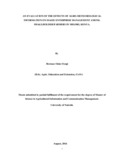| dc.contributor.author | Oyugi, Herman O | |
| dc.date.accessioned | 2016-11-17T07:39:42Z | |
| dc.date.available | 2016-11-17T07:39:42Z | |
| dc.date.issued | 2016 | |
| dc.identifier.uri | http://hdl.handle.net/11295/97486 | |
| dc.description.abstract | This study sought to determine the awareness, access to and the effects of agro-meteorological information on the maize enterprise management among smallholder farmers in Suna-East of Migori County, Kenya. The objective of this research was to assess how effective agro-meteorological information is in maize enterprise management and selection among small-holder maize farmers. This study was informed by the fact that the frequency and severity of extreme weather events such as floods and prolonged droughts has compromised small holder farmers‘ agricultural productivity. Agro-meteorological information application has proven to yield benefits in crop production. A systematic random sampling procedure was employed to select 217 farmers from a total population of 529 smallholder farmers. The socio-economic characteristics of the farmers were described using descriptive statistics. Multiple linear regression statistical model, correlation analysis and Analysis of variance (ANOVA) were employed to determine variables influence of awareness, access and use of agro-meteorological information on maize enterprise selection and management. The results indicate that (63.4%) of the farmers were aware of agro-meteorological information, while only (43.7%) indicated to have access to the information either from friends, neighbors, mass media or agricultural extension agents. Correlation analysis conducted revealed that access to agro-meteorological information (r=0.149 at p≤0.015) and (r=0.074 at p≤0.142) had influence on maize enterprise selection and management respectively. The results of multiple linear regression models showed that there is correlation coefficient p≤0.493 and an F value of 0.972 among the variables that influence the use of agro-meteorological information in maize enterprise selection. A correlation coefficient p≤0.045 and an F value of 3.458 among the variables that influence the use of agro-meteorological information in maize enterprise management. This shows that farmers who have access to agro-meteorological information do not use the information in enterprise selection but use the information in the management of maize enterprise. The study recommended the need to make use of different dissemination channels for different periods, priming and proper framing of agro-meteorological information on the mass-media. It is necessary to consider not only the provision of the information but also specify the information to a particular geographical zone and avoid generalizations in giving advisories by both the mass media and advisory groups. An important goal in agro-meteorology should be developing models for enterprise selections. | en_US |
| dc.language.iso | en | en_US |
| dc.publisher | University of Nairobi | en_US |
| dc.rights | Attribution-NonCommercial-NoDerivs 3.0 United States | * |
| dc.rights.uri | http://creativecommons.org/licenses/by-nc-nd/3.0/us/ | * |
| dc.subject | Agro-meteorological Information on Maize | en_US |
| dc.title | An Evaluation of the Effects of Agro-meteorological Information on Maize Enterprise Management Among Smallholder Farmers in Migori, Kenya. | en_US |
| dc.type | Thesis | en_US |



